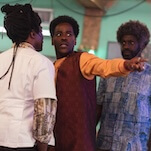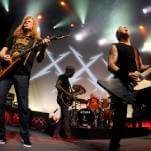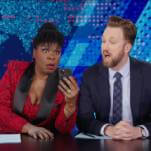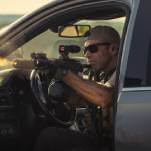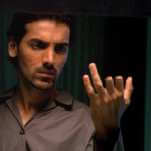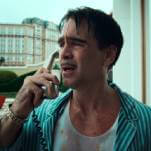I'm torn. (Thankfully, no nudity and floor-lying required.) I really like the conceptual foundation behind an episode like this one. I think it's a smart way to pace out a season, help strengthen the audience's bond with the crew, and give the Enterprise a lived-in feel that the original show never managed. I always get frustrated with people who criticize a series for taking its time, as if character and setting were merely the spoonfuls of sugar we ingest to keep swallowing the ongoing plot. Maybe it's just how I watch television, but I enjoy the occasional low-key entry. Too many, and a show can turn sluggish and meandering, but without any, it becomes far more difficult for a series' world to catch hold of my imagination. (A perfect example of how to do this well came in the last season of Breaking Bad. Bad is one of the tightest, best paced shows ever made for television, and two-thirds of the way through this year's crazy melange of agony and miscalculation, we got "Fly," which spent nearly the whole running time on the show's two leads and barely moved the main storyline at all. Some viewers complained this was a waste, but it's crucial to the season, because it stops the tidal wave just long enough to remind us the lives that will be lost in all that rushing water.)
It's silly, and it's not much fun to watch. Are we laughing at her? With her? It's one thing to have Lwaxana be forceful and obnoxious, but here she's being mocked for entering her species' Opposite Day version of menopause, and that's sad. The holodeck joke is a step too far, I think, as it's unbelievable that the woman would have no idea of what a holodeck is, Betazoid or no. It plays as a kind of just deserts for all her interfering on the ship, and I'm not entirely comfortable with that. We've seen Worf's rage issues treated with dignity and respect, so why should Lwaxana's onrush of lust, over which she has roughly the same control as Worf does his anger, be played for broad comedy? That she casually unmasks the Antedeans as spies at the end at least gives her some purpose, but this is all very poorly thought out.
About the only clever bit in the episode is during Picard's playtime as Dixon Hill on the holodeck. Picard lounges in his office, various thugs arrive to threaten him, and then he heads to a bar where he learns which novel he's currently participating in. There's no effort to connect this novel with the rest of the episode's storyline (apart from both being about manhunts), but that works. More than the last time we saw Picard play this game, this particular adventure feels like what you'd imagine a computer simulation of a fictional setting should feel, as though the edges of the stage lay just beyond the sightlines. Even better are Picard's attempts to force the program into giving him a more relaxed atmosphere. Each iteration the computer tries only makes the situation worse, because the kind of laid-back, just chillin' vibe the captain is searching for simply doesn't exist in Dixon Hill land.
Stray Observation:
- It doesn't really start till next episode, but this turned out to be a good week for Worf. His comments on the Antedeans ("What a handsome race") are great.
- Picard just doesn't seem to "get" the holodeck, does he?
"The Emissary"
Most romantic comedies suck. All right, let's be honest, most movies suck, things being what they are, and the ratio of suck to good of romantic comedies isn't much worse than that of, say, costume dramas or action flicks. The difference is, the lessons action movies teach us about life tend to be about situations that aren't going to come up in the real world. It would be a bad thing if I shot the least likely murder suspect right off to save myself a third act, but I don't own a gun, and no credible police force in the world is going to accept an application written mostly in highlighters. (Everybody steals my pens at the office.) Rom-coms, though, can mess a person up. Their circumstances are heightened for dramatic purposes, but the basic emotions and problems are ones most people can relate to—generally speaking, we all want somebody to love. And if we start following the lessons we learn in Sleepless In Seattle while we're on the road to finding what we want, we can expect a lot of heartbreak, awkward conversations, and the occasional restraining order.
This is why Klingons are awesome. Seriously! We haven't had much of a chance to watch their mating rituals, but between Worf's explanation to Wesley in "The Dauphin," and the sparks between Worf and this week's special guest star, we have a picture of the standard rom-com devices taken to their utmost extremes. The woman is aggressively disinterested in the male, and the male continues expressing adoration while doing his best to avoid bodily harm. It's hilarious, but it's weirdly charming, too, because by making the woman the physical threat, and turning the aggressive pursuit that so many rom-coms demand of their male participants into a polite, noninvasive persistence, the unpleasantness of the scenario is undercut. Is Worf a little pushy here? Maybe. But the object of his affections is never threatened or forced into an arrangement, and she doesn't have to soften her personality too much before the end credits.
"The Emissary" is the kind of episode that makes me view junk like "Manhunt" a little more favorably. "Emissary" is decidedly not a hang out episode—we've got a strong plot, there are stakes, and Worf and K'Ehlyer's relationship is the character focus. Yet all the slower eps that preceded this one have ensured that we care what happens to Worf. He's gone from being a sight gag ("Holy crap, there's a Klingon on the bridge! What's with the face?") to a funny, nuanced personality, and that wouldn't have happened without scenes like the Klingon Tea Ceremony from "Up The Long Ladder." That doesn't redeem the weak spots, obviously. One would hope that it'd be possible to create strong character beats and not suck, but it's nice to know there's a little good mixed in with the bad. Even better, the solid quality and care that goes into "Emissary" raises my hopes for next season. This isn't a great episode, but it's damn good, and if it serves as the baseline of quality, we've got some exciting times ahead of us.
Even the hook is cool. A Klingon ship named the T'Ong was sent out over seventy years ago on a secret mission. This was well before the Klingon Empire and the Federation decided to play nice, and the crew of the T'Ong are in cryogenic sleep, running on deep cover and impossible to contact before they're deep into Federation space. The fear is that they'll blow some outposts up before they realize everybody's friendly now, and given the touchy nature of Klingon honor, explaining the intricacies of the current universal-political situation presents certain difficulties. To this end, Starfleet sends an emissary to explain the situation to the Enterprise and hopefully find some way of resolving the issue that results in the fewest deaths possible. That emissary is the aforementioned K'Ehlyer, a half-Klingon/half-human woman who has a history with Worf.
The suspense here isn't that the Klingons will kill some innocents. The T'Ong is 70 years old, so it doesn't pose much of a threat to the Enterprise. The suspense here is whether or not K'Ehlyer and Worf can figure out a way to stop the newly awakened crew without having to destroy them and their ship. The stakes are moderate, and the real tension comes from watching the two characters bounce off each other in a situation they can't simply walk away from. (Worf tries to get himself excused from the assignment, but Picard nixes the idea.) It's more a question of psychology, and we're invested in the outcome because it has consequences, because the solution isn't readily evident, and because it comes as much from internal as external strife.
K'Ehlyer is interesting. The actress, Suzie Plakson, played a Vulcan in "The Schzoid Man," and her restrained smirk gets more of a work-out here. Her sarcasm grates after a while, but that makes sense. As a half-Klingon, half-human, she believes she got the worst of both species. She deals with this by displaying open contempt for Klingon ways, repeatedly advising Picard that the only way to deal with the T'Ong is to destroy them. It's not that she hates the Klingons so much as she hates the intense emotional side of her she associates with her Klingon heritage. She keeps those emotions in tight check, but can't banish them completely, which is why Worf gives her such fits. He's comfortable with his heritage in a way that K'Ehlyer can't quite manage, despite (well, more like because) the fact that K'Ehlyer must've spent more time with Klingons growing up. Plus, there are all those strange feelings his awesomeness inspires in her.
"Emissary" works because Worf and K'Ehlyer's interactions are never forced to the point of artificial drama. A lot of what we see here are familiar rom-com beats, with the initial tension, the banter, the break-through interaction, sex, a separation, and finally a reconciliation. However, most rom-coms don't have a scene where the two near-lovers bond while fighting computer generated monsters. Action movies without number have used adrenaline as a substitute for actual connection, but here the thrill of battle is an integral aspect of the characters. This is how they communicate. The resolution with the T'Ong pays off as well as Worf, despite K'Ehlyer's objections, comes up with a solution to the problem that allows everyone to walk away alive. It also lets Worf show off his leadership abilities, and the ladies love those.
So we have a familiar romantic arc here, but done quite well, and we have one of the show's best supporting characters getting a chance to shine. I can't imagine the TNG of season one managing this effective a mixture of psychology and plotting, and it's nice to see we've come this far.
Grade: B+
Stray Observations:
- "Computer—Level Two." Is it weird that that's kind of hot?
- So the Klingons get married right after sex? That's intense.
- Another poker game to start the episode, and this one, with its focus on Worf, is actually relevant to the plot.
"Peak Performance"
I was the foreman on a jury last year. It was a fascinating experience; the case was interesting, and while there were boring spots, it was cool seeing the legal system up close. Being the foreman meant that I was supposed to lead the deliberations when it came time for us to render a verdict. I did a lousy job, I think. I spent most of the trial convinced the defendant was blatantly guilty, and sure that everyone else would agree with me, but they didn't. In fact, I was the only person who didn't want to acquit, and when I realized this, I choked. I thought I'd be able to lead people, and instead I got nervous and talked too loud. I gave up almost immediately on trying to change anyone's minds. We decided on an acquittal. I rationalize this by telling myself that I could've been wrong, and that it's better to err on the side of caution when it comes to guilty and not guilty. It still bothers me though. Not because the defendant got off, but because when I was invested with even a minor amount of responsibility and power, I choked.
Leadership is tricky business. It requires tact, self-confidence, brains, charisma, empathy, and… something else. Something you don't really know until you see it, and something you can't find in yourself until your ass is on the line. That last bit is the killer. You can have all the tools necessary for the job, all the training and the background and the good marks, and then you find yourself standing on the bridge of a starship when a Romulan cruiser de-cloaks of your bow, and you turn to the ensign at the helm and you just—choke. Riker is a good second in command. He and Picard get on well, compliment each other in the right ways, and Riker's amiability provides a crucial link to the crew. Picard believes in keeping his distance, and Riker, as we've seen, is on friendly terms (and sometimes more than friendly) with the just about everyone on board the Enterprise. Riker isn't going to be Number One forever, though. Someday he'll have a ship of his own, and when that day comes, will he be ready for it?
"Peak Performance" is another fun episode. Riker plays a key role, but this is more of an ensemble piece than "The Emissary" was, giving nearly every major character a moment to shine, and once and for all ridding me of my dislike for Dr. Pulaski. (Which is a shame, considering she'll be off the show so soon.) The Enterprise is preparing for a war game: Riker, with a skeleton crew of 40, will take charge of an older ship (dig the TOS sound effects!) and stage a mock battle to show his effectiveness as captain. An annoying, snobbish alien shows up to tell everyone what they're doing wrong, Wesley Crusher finds a clever way to cheat, and the Ferengi don't actually ruin everything. It's like Christmas in Heaven.
That alien, Sirna Kolrami, (Roy Brocksmith, the man with the fatal sweat in Total Recall), is really, really annoying. His race are supposedly brilliant tacticians, but as Worf points out early on, if they're so brilliant no one will challenge them, how do you know their worth? Mainly, Kolrami is around to get on everyone nerves, doubt Riker, and give Data a storyline. We'll get to the Data story in a sec, but Kolrami's criticisms of Riker are important because Riker's success wouldn't mean quite as much otherewise. There's no one on the Enterprise we've seen who wouldn't consider Riker more than qualified for command, not even some random one-off introduced just for the episode and then forgotten. It's not necessary to have Riker change anyone's mind, of course. The sudden arrival of the Ferengi means that a failure here would have severe consequences, and not just a Starfleet reprimand. It's just nice to have a stranger tell us someone we like is cool.
It's also nice watching Riker put together his "away team," and seeing how Geordi, Worf, Wesley, and the others deal with the restrictions of their new assignment. I wouldn't have minded a little more of this, because I have a soft spot for team storylines. People overcoming handicaps to achieve a seemingly impossible goal is a well-established genre staple, but when it's done well, as it is here, it's tremendously entertaining. Everybody gets to show-off: with Geordi's help, Wesley figures out how to give their new-old ship warp drive, and Worf comes up with a nifty plan to distract the Enterprise when it becomes time for battle. Riker provides encouragement, marshals his forces, and, when it's time to make the tough decisions, stands by his crew. Seriously, if this had been the whole episode, it would've been great. As it is, the confrontation between Riker and Picard lasts maybe three minutes before the Ferengi show up and change the stakes. It's not a bad twist, but given that every battle simulation in the history of genre fiction has always ended in a "surprise" real battle, I would've liked it if "Performance" had gone a different route.
As for Data's story, well, I said I don't have a problem with Pulaski anymore, and I stand by that. She cons Data into playing a game of Stratagema against Korlami because she wants to see the alien get his butt kicked. When Data loses, he experiences a crisis of faith in himself. Pulaski's manipulations are entertaining, and it's nice to see her loosening up more. Even better, she apologizes to Data after the first match goes poorly. As arcs go, it's minor. The actual gaming is silly (they must have very different concepts of strategy in the 24th century, as that looked mostly like a reflex test), and Data's insecurities are a little Afterschool Special-ish. Still, Data's solution to the problem—to defeat Korlami by playing to tie, not win, and thus wear him down till he gives up in frustration—is sharp. It might have made more dramatic sense to have Data simply realize that you can't win every battle, but at least the resolution here gave us a little credit.
Another solid entry, then. We learn that Riker really can lead (and this is handled rather subtly, as Riker himself doesn't do much after choosing his team; the point being that a large part of being a good leader is to know who you need for an assignment, and then getting the most out of them), Wesley is still clever as the dickens, and the Ferengi are still fairly dumb. No major revelations or shocking twists, but very credible work. While episodes like "Q Who?" make Trek fans, it's eps like this one that ensure those fans keep coming back. Nothing too flashy, but it gets you where you want to go.
Grade: B+
Stray Observations:
- If you're a fan of 24, you may have recognized the new ensign in this episode as Glenn Morshower, aka Secret Service Agent Aaron Pierce. Armin Shimerman, who would turn up as Quark on Deep Space Nine, plays DaiMon Bractor of the Ferengi ship.
- The wisdom of Captain Picard: "Commander, it is possible to commit no mistakes and still lose. That is not a weakness. That is life."
- Next week, we're going to have a slight change of pace. "Shades of Grey" marks the end of the second season, so I'll be covering that and then giving my overall thoughts on the second season. We'll get into the third season the following week.
















